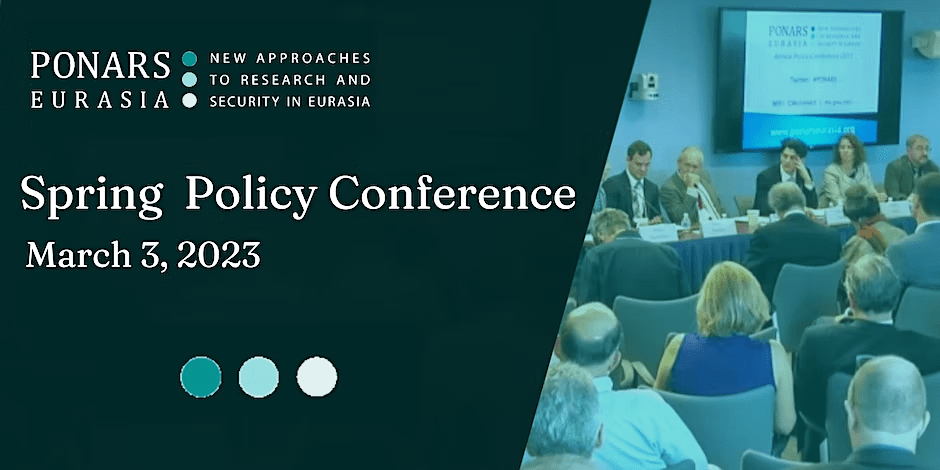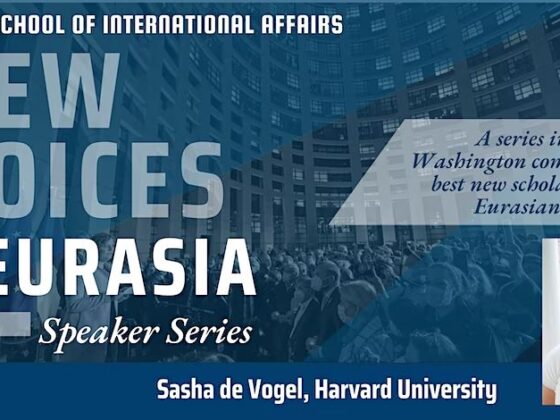Thank you for joining us! See the event videos on YouTube.
The annual PONARS Eurasia Spring Policy Conference convenes international experts from North America, Russia, Ukraine, and other parts of Eurasia for a series of panel discussions. This year’s hybrid event offers insight from leading scholars and experts into comparative politics and society in the region, both related to and beyond Russia’s ongoing war in Ukraine.
Friday, March 3, 2023 | Elliott School of International Affairs (1957 E St NW) or Online.
AGENDA
9:00 am: Opening Remarks: David Szakonyi, George Washington University
9:00-10:30 am: Panel 1: Ukrainian Society and Politics in Wartime
Chair: Henry Hale, George Washington University
Tymofii Brik (online), Kyiv School of Economics
“Decentralization and Trust in Government: Quasi-experimental Evidence from Ukraine”
Oleksandr Fisun, Kharkiv National University
“How the Russian Invasion Changed Ukraine’s Political Landscape”
Ivan Gomza (online), Kyiv School of Economics
“Political and Societal Medium-Term War Outcomes: Historical Perspectives and Tentative Projection for the Russo-Ukrainian War”
Tetyana Malyarenko (online) and Borys Kormych (online), National University of Odesa Law Academy
“Russian Policy Towards the Economy of Occupied Ukrainian Territories: Crawling De-Modernization”
Discussant: Michael Keays, Wilson Center
10:30-10:45 am: Coffee Break
10:45 am-12:30 pm: Panel 2: Authoritarianism and Democracy Promotion
Chair: Mikhail Troitskiy, University of Wisconsin-Madison
Hannah Chapman, University of Oklahoma
“All Fraud is Not Created Equal: Recent Electoral Manipulation Practices Are Less Likely to Incite Public Ire”
Emil Dzhuraev (online), Soros Foundation-Kyrgyzstan
“Il Nuovo Principe: How Sadyr Japarov turned democracy on itself and ruled bravely thereafter”
Cole Harvey, Oklahoma State University
“The Risk of Protest Won’t Stop Election Manipulation: Implications for Democracy Assistance”
Valerie Sperling, Clark University and Laura Henry, Bowdoin College (co-authored with Lisa Sundstrom)
“Exodus: Russian Repression and Social ‘Movement’”
Margarita Zavadskaya, University of Helsinki, Finland (online)
“Civic Activism among Russian Migrants after February 24: Evidence from Panel Survey Data”
Discussant: Heather Ashby, U.S. Institute of Peace
12:30-1:30 pm: Lunch
1:30-3:00 pm: Panel 3: Russian War Practice and Consequences
Chair: Timothy Frye, Columbia University
Kristina Hook, Kennesaw State University
“The Policy Implications of Russia’s Genocide in Ukraine”
Marat Iliyasov, Miami University of Ohio
“The Chechen Factor in the War on Ukraine”
Jean-François Ratelle, University of Ottawa
“Ramzan Kadyrov, Chechnya, and the War in Ukraine”
Andrei Semenov (online), Higher School of Economics, Moscow
“Getting Messages Across: War Propaganda in Russian Press and Social Media”
Discussant: Miriam Lanskoy, National Endowment for Democracy
3:00-3:15 pm: Coffee Break
3:15-5:00 pm: Panel 4: Russian Ideology and Values on the Offensive
Chair: Marlene Laruelle, George Washington University
Antonina Berezovenko, George Washington University
“Putin: The Cult of Personality”
Ivan Fomin, Center for European Policy Analysis (CEPA)
“Putin’s Ideology of ‘Traditional Values’ in Action”
Ivan Grek, George Washington University
“The Grassroots of Putin’s Ideology: Civil Origins of an Uncivil Regime”
Azamat Junisbai, Pitzer College
“Making Sense of Russian Support for War Against Ukraine: A Central Asian Perspective”
Katie Stewart, Knox College
“Consolidating Values to Consolidate Power in Russia”
Discussant: Eva Busza, National Democratic Institute











